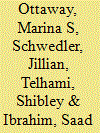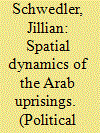|
|
|
Sort Order |
|
|
|
Items / Page
|
|
|
|
|
|
|
| Srl | Item |
| 1 |
ID:
103867


|
|
|
|
|
| Publication |
2011.
|
| Summary/Abstract |
Recent years have seen a surge of studies that examine the inclusion-moderation hypothesis with reference to political Islam: the idea that political groups and individuals may become more moderate as a result of their inclusion in pluralist political processes. Most of these interventions adopt one of three foci: (1) the behavioral moderation of groups; (2) the ideological moderation of groups; and (3) the ideological moderation of individuals. After a discussion of various definitions of moderate and radical, the concept of moderation, and the centrality of moderation to studies of democratization, the author examines the scholarship on political Islam that falls within each approach. She then examines several studies that raise questions about sequencing: how mechanisms linking inclusion and moderation are posited and how other approaches might better explain Islamist moderation. Finally, she offers a critical analysis of the behavior-ideology binary that animates many of these models and suggests some fruitful paths for future research.
|
|
|
|
|
|
|
|
|
|
|
|
|
|
|
|
| 2 |
ID:
062169


|
|
|
| 3 |
ID:
121615


|
|
|
|
|
| Publication |
2013.
|
| Summary/Abstract |
Analyses of the spread of the Arab uprisings have been dominated by three comparative angles. Single-country studies have emerged as the most common framework, often put to use in a second comparative approach of examining variation across cases. For example, studies explore which states have had major uprisings and which have not, which uprisings were peaceful and which were violent, and so on (Amar and Prashad 2013; Haddad, Bsheer, and Abu-Rish 2012; McMurray and Ufheil-Somers 2013; Sowers and Toensing 2013). A third approach explores comparisons with other waves of popular mobilization against authoritarian regimes, for example, in Europe during the mid-nineteenth century, Eastern Europe following the collapse of the Soviet Union in 1989, and so on (Patel, Bunce, and Wolchik 2013 Weyland 2012). These literatures investigate the complex processes of mobilization, revolution, and transition unfolding in parts of the Middle East since the outbreak of the uprisings in late 2010. From the literature on revolutions, for example, we know that a popularly based movement that brings about some change in political leadership does not necessarily lead to a regime change resulting in a fundamental overturning of an economic, political, or social system. From past cases we have learned that at least some old institutions and alliances almost always reemerge, and what form the new institution will take eventually is often unknown for several years-for example, think of the Iranian revolution, let alone the French revolution. As events in postrevolutionary Tunisia, Libya, Egypt, and Yemen continue to unfold-and it is questionable whether those revolutions are even over-and as the bloody civil war in Syria continues, these insights provide us with useful tools for examining how institutions, processes, and power relations are changing-and how they are not.
|
|
|
|
|
|
|
|
|
|
|
|
|
|
|
|
| 4 |
ID:
050031


|
|
|
|
|
| Edition |
2nd ed.
|
| Publication |
London, Lynne Rienner Publishers, 2004.
|
| Description |
xvii, 477p.: ill., maps, tablespbk
|
| Series |
Introduction to the States and Regions of the Contemporary World
|
| Standard Number |
1588260623
|
|
|
|
|
|
|
|
|
|
|
|
Copies: C:1/I:0,R:0,Q:0
Circulation
| Accession# | Call# | Current Location | Status | Policy | Location |
| 047436 | 956/GER 047436 | Main | On Shelf | General | |
|
|
|
|
|
|
|
|
|